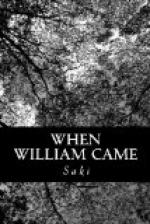of men that mattered. Hunting-box and stable
and gun-room dwindled to a mere pin-point in the
universe, there were other larger, more absorbing things
on which the mind dwelt. There was the grey
cold sea outside Dover and Portsmouth and Cork, where
the great grey ships of war rocked and swung with
the tides, where the sailors sang, in doggerel English,
that bitter-sounding adaptation, “Germania
rules t’e waves,” where the flag of a
World-Power floated for the world to see. And
in oven-like cities of India there were men who looked
out at the white sun-glare, the heat-baked dust, the
welter of crowded streets, who listened to the unceasing
chorus of harsh-throated crows, the strident creaking
of cart-wheels, the buzz and drone of insect swarms
and the rattle call of the tree lizards; men whose
thoughts went hungrily to the cool grey skies and
wet turf and moist ploughlands of an English hunting
country, men whose memories listened yearningly to
the music of a deep-throated hound and the call of
a game-bird in the stubble. Yeovil had secured
for himself the enjoyment of the things for which
these men hungered; he had known what he wanted in
life, slowly and with hesitation, yet nevertheless
surely, he had arrived at the achievement of his unconfessed
desires. Here, installed under his own roof-tree,
with as good horseflesh in his stable as man could
desire, with sport lying almost at his door, with his
wife ready to come down and help him to entertain his
neighbours, Murrey Yeovil had found the life that
he wanted—and was accursed in his own eyes.
He argued with himself, and palliated and explained,
but he knew why he had turned his eyes away that evening
from the little graveyard under the trees; one cannot
explain things to the dead.
CHAPTER XIX: THE LITTLE FOXES
“Take us the foxes, the little
foxes, that spoil the vines”
On a warm and sunny May afternoon, some ten months
since Yeovil’s return from his Siberian wanderings
and sickness, Cicely sat at a small table in the open-air
restaurant in Hyde Park, finishing her after-luncheon
coffee and listening to the meritorious performance
of the orchestra. Opposite her sat Larry Meadowfield,
absorbed for the moment in the slow enjoyment of a
cigarette, which also was not without its short-lived
merits. Larry was a well-dressed youngster,
who was, in Cicely’s opinion, distinctly good
to look on—an opinion which the boy himself
obviously shared. He had the healthy, well-cared-for
appearance of a country-dweller who has been turned
into a town dandy without suffering in the process.
His blue-black hair, growing very low down on a
broad forehead, was brushed back in a smoothness that
gave his head the appearance of a rain-polished sloe;
his eyebrows were two dark smudges and his large violet-grey
eyes expressed the restful good temper of an animal
whose immediate requirements have been satisfied.
The lunch had been an excellent one, and it was jolly
to feed out of doors in the warm spring air—the
only drawback to the arrangement being the absence
of mirrors. However, if he could not look at
himself a great many people could look at him.




